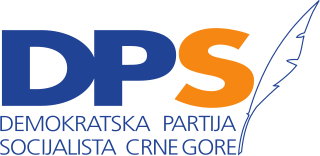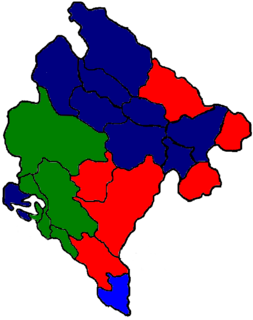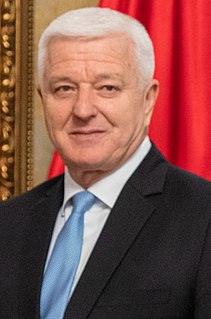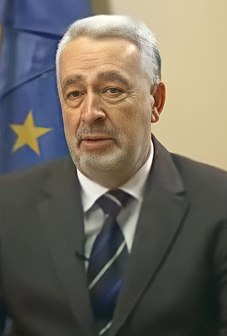| |||||||||||||||||||||||||||||||||
| |||||||||||||||||||||||||||||||||
 Mayoral seats | |||||||||||||||||||||||||||||||||
Montenegrin municipal elections were held in all 23 municipalities, between March 2012 and May 2014.
| |||||||||||||||||||||||||||||||||
| |||||||||||||||||||||||||||||||||
 Mayoral seats | |||||||||||||||||||||||||||||||||
Montenegrin municipal elections were held in all 23 municipalities, between March 2012 and May 2014.
| Party | Votes | % | Seats [1] |
|---|---|---|---|
| Coalition for European Podgorica | 49.146 | 47.2% | 29 |
| Democratic Front | 30.002 | 27.6% | 17 |
| Socialist People's Party | 14.776 | 14.9% | 8 |
| SDP-Positive Montenegro | 9.454 | 8.8% | 5 |
| Albanian Coalition | 1.242 | 0.8% | 0 |
| Party | Percentage | Seats [3] |
|---|---|---|
| Coalition for European Montenegro | 51.7% | 23 |
| Democratic Front | 31.2% | 13 |
| Socialist People's Party | 8.5% | 3 |
| Positive Montenegro | 6.6% | 2 |
Elected mayor - Veselin Grbović (European Montenegro - Positive)
| Party | Percentage | Seats [4] |
|---|---|---|
| Democratic Party of Socialists | 35.6% | 13 |
| The Choice - Local Group of Citizens | 24.9% | 9 |
| Let's Save Herceg Novi - SNP, DF | 23.3% | 8 |
| Novi List | 5.3% | 2 |
| Social Democratic Party | 5.2% | 2 |
Turnout - 68.2% Elected mayor - Nikša Gojković (The Choice - DPS coalition)
At elections in the rest of municipalities ruling DPS stay in power in most municipalities. It held an absolute majority in Bar, Žabljak, Budva and Bijelo Polje, formed ruling coalitions with SDP in Danilovgrad, Pljevlja, Andrijevica, Šavnik, Tivat, Cetinje, Kotor and Mojkovac and with Bosniak Party in Plav, Rožaje, Petnjica and Gusinje, and in Herceg Novi, where DPS-SDP coalition formed majority with local parties. [5] The opposition won only in Plužine, where the local SNP won absolute power, in Berane, where the opposition formed a joint coalition at the local level and in Kolašin where SDP form an post-election coalition with opposition to form local government. While in Ulcinj, the local government formed the Albanian minority parties.

The Democratic Party of Socialists of Montenegro is an opposition catch-all and a populist political party in Montenegro. The party was formed in 1991 as the successor of the League of Communists of Montenegro, which had governed Montenegro within the Yugoslav federation since World War II. Since its formation and the introduction of a multi-party system, the DPS has played a dominant role in Montenegrin politics, forming the backbone of every coalition government until 2020, when it entered the opposition in the aftermath of the 2020 parliamentary elections. This marked the first time since 1945 that the party had not been in power. The current President Milo Đukanović is the member of the party, including the former Prime Minister Duško Marković. The DPS is internationally affiliated with the Socialist International and Progressive Alliance, and is an associate affiliate of the Party of European Socialists.

The Socialist People's Party of Montenegro is a socially conservative social-democratic political party in Montenegro. Party is a founding member of the For the Future of Montenegro political coalition in August 2020. Coalition won 27 seats in the 81-seat parliament of Montenegro at the 2020 election, 5 of those belonging to SNP. The party is pro-European Union and anti-NATO.
The European Montenegro was the ruling political alliance in Montenegro headed by Milo Đukanović's Democratic Party of Socialists (DPS).
The Restart Coalition is a centre-left political alliance in Croatia. The coalition was formed in 2010 as the Kukuriku Coalition. This somewhat facetious name meaning 'cock-a-doodle-doo', taken from a restaurant of the same name in Kastav where the coalition leaders first convened in July 2009, became well known and was eventually taken as the coalition's official name. The coalition originally consisted of four centrist and centre-left parties in the Croatian Parliament: the Social Democratic Party of Croatia (SDP), Croatian People's Party – Liberal Democrats (HNS-LD), Croatian Party of Pensioners (HSU) and Istrian Democratic Assembly (IDS). The coalition won an absolute majority of seats in the 2011 parliamentary election and successfully formed a government led by Zoran Milanović (SDP).

The Democratic Front is a right-wing populist and social conservative opposition political alliance in Montenegro. It is currently composed of the New Serb Democracy (NSD), Movement for Changes (PzP), Democratic People's Party (DNP), True Montenegro (PCG), United Montenegro (UCG) and Workers' Party (RP). The main goal of the DF is to overthrow the ruling Democratic Party of Socialists of Montenegro (DPS), which was in power in country since introduction of the multi-party system in 1990, until 2020 parliamentary election.

Parliamentary elections were held in Montenegro on 16 October 2016. The ruling Democratic Party of Socialists (DPS) remained the largest party, winning 36 of the 81 seats, and subsequently formed a coalition government with the new Social Democrats and national minority parties. The elections were held in the midst of an alleged coup d'état attempt.

Parliamentary elections were held in Montenegro on 30 August 2020. They were the eleventh parliamentary elections since the first multi-party elections in 1990, and the fifth in Montenegro since gaining its independence in 2006. Eighty-one members of the Montenegrin parliament were elected. Elections were organized in special conditions, due to the COVID-19 pandemic in Montenegro. The parliamentary election was also held simultaneously with the local elections in five municipalities.

Democratic Montenegro, also known as the Democrats, is a centrist and big tent political party in Montenegro. Party currently has nine MPs in the parliament, elected in 2020, from the Peace is Our Nation electoral list. Its founder and current leader is Aleksa Bečić, incumbent President of the Parliament. It is also the second largest political party in the parliament.

In Montenegro, the Opposition is all of the political parties represented in Parliament that are not a part of the Government supported by the parliamentary majority.

Presidential elections were held in Montenegro on 15 April 2018. Former Prime Minister Milo Đukanović of the ruling Democratic Party of Socialists (DPS) was elected as President of Montenegro in the first round.
City Assembly elections will be held in Podgorica, the capital of Montenegro, on 27 May 2018. Parties and coalitions ran for 61 seats in the Assembly, with 3% election threshold required to win seats.

Montenegrin municipal elections were held in all 21 municipalities, between June 2000 and October 2002.

Montenegrin municipal elections were held in all 21 municipalities, between June 2004 and October 2006. It resulted in the victory of the ruling DPS-SDP coalition in 15 out of 21 municipalities, where they secured a majority, alone or in a coalition with national minority parties.

Montenegrin municipal elections were held in all 21 municipalities, between April 2004 and October 2006. It resulted in the decisive victory of the ruling Coalition for European Montenegro in 18 out of 21 municipalities, where he has secured a majority, on its own or in a coalition with national minority parties.
Municipal elections were held in Capital City of Podgorica and eleven other municipalities of Montenegro on 25 May 2014.

The Marković Cabinet, led by Duško Marković, is the 41st cabinet of the Montenegro. Cabinet was elected on 28 November 2016 by a majority vote in the Parliament of Montenegro. The coalition government was composed of the Democratic Party of Socialists (DPS), the Social Democrats (SD), and ethnic minority parties.

The sixth cabinet of Milo Đukanović was the cabinet of Montenegro from 4 December 2012 to 28 November 2016. It was a coalition government composed of centre-left Coalition for a European Montenegro and national minority parties. Split in the ruling DPS-SDP coalition in January 2016, leaving the government functioning as a de facto minority government. The Cabinet was functioning as the provisional government , from 12 May to 28 November 2016, with several Ministers from opposition parties joined the government.

For the Future of Montenegro was a catch-all, mainly cultural conservative and populist pre-election opposition political coalition in Montenegro, formed for the August 2020 parliamentary election. The coalition common list for 2020 election is led by a Montenegrin university professor, Zdravko Krivokapić.
Municipal elections were held in Montenegro on 30 August 2020 in Andrijevica, Budva, Gusinje, Kotor and Tivat.

The Cabinet led by Zdravko Krivokapić, is the 42nd cabinet of Montenegro. Krivokapić Cabinet was elected on 4 December 2020 by a majority vote in the parliament. The technocratic government is composed of independents and is supported by the four parliamentary groups; Democratic Front, Peace is Our Nation, Socialist People's Party (SNP) and the United Reform Action (URA).
| This Montenegrin elections-related article is a stub. You can help Wikipedia by expanding it. |